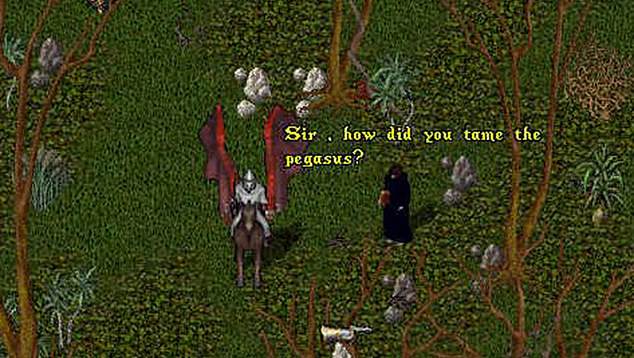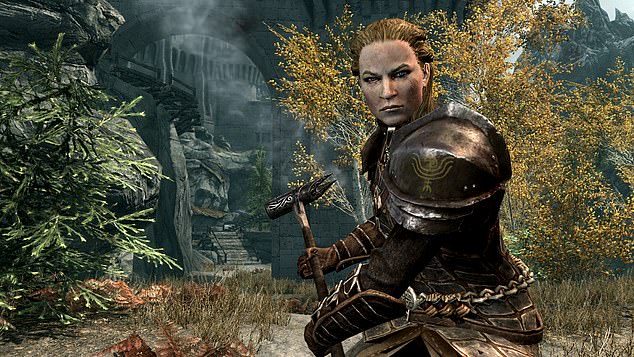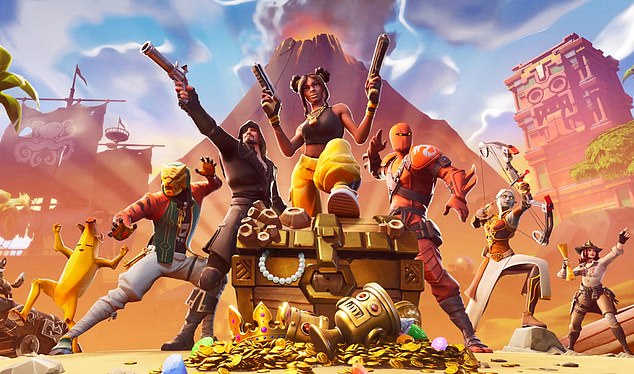- Gen Z is using video game slang just like previous generations use sports terms
- Experts say that this is creating a new etymological category of gaming slang
From ‘beef’ to ‘bare’, it’s safe to say that many members of Generation Z have their own language.
Now, a Harvard-trained linguistics expert has revealed how Gen Z (those born in the late 1990s and early 2000s) have started to use video game terms.
Just as previous generations have used sports metaphors as part of everyday language, video games are now becoming part of how young people understand the world, according to Adam Aleksic.
So whether you’re being called an NPC, getting asked ‘where we dropping?’, or doing sidequests, it turns out that Gen Z could be talking about you behind your back.
Thankfully, help is at hand, as we’ve compiled a list of some of the most common video game terms – and what they mean in Gen Z’s modern dictionary.

A Harvard-trained linguistics expert has revealed how Gen Z (those born in the late 1990s and early 2000s) have started to use video game terms (stock image)
Video game slang terms
Nerf
To reduce in power or make worse, usually to make things more balanced.
NPC
A non-player character, often used to describe someone as lacking in spontaneity or genuine feelings.
Sidequest
Any task or pursuit that is seperate from achieving your main goals.
Where we dropping?
Used to ask where we are going or where a group is planning to end up.
Mr Aleksic, who posts under the name Etymology Nerd, says that Gen Z’s use of video game terms in real life is actually a new type of etymological category.
In the video, he explains: ‘It’s kind of like all the sports metaphors we’ve built up over time.’
Terms like ‘swing and a miss’ or ‘coming out of left field’ all originate in the game of baseball but have now taken on more serious or abstract meanings.
‘Now we’re in a whole new ball game of people having a shared cultural knowledge of video games, so we’ve started drawing on that as a way to express our reality,’ Mr Aleksic explains.
This is not a new phenomenon, with our use of gaming metaphors stretching all the way back to the 12th and 15th centuries with the importance of chess.
Mr Aleksic says: ‘We started drawing on chess terms like “pawn” or “gambit” to describe non-chess situations.’
Even the term “check” evolved from the literal attack on the king in chess to mean stop and consider as we use it today.
While video game terms might be used mainly by Gen Z today, Mr Aleksic says they could become much more important in the future.
READ MORE: How much Gen Z slang do YOU know? MailOnline asks millennials and boomers if they know the real meaning of terms like peng, bare and beef
Nerf
If you’ve spoken to members of Gen Z or spent much time playing online games you’ve certainly heard someone say the classic refrain: ‘PLS Nerf’.
Nerf is one of those video gaming terms that has taken a convoluted path to its final meaning.
The term originates with the Nerf foam darts and swords that became popular in the 1990s.
From there, the term appears to make the jump into video games in the 1997 MMORPG Ultima Online.
When the game’s developers released an update which massively reduced the strength of swords, some players complained that it was like using ‘Nerf swords’.
The term has now spread everywhere to mean any big reduction in strength, power, capacity or ability.
Someone might call something ‘nerfed’ to mean it’s been made a lot worse or complain that something needs to get ‘nerfed’ for fairness.
Nerf is also the flip side to the term ‘buff’ which means to make something stronger or generally better.

The term nerf, meaning to make weaker or worse, appears to originate from the 1997 game Ultima Online (pictured) where players complained that weak weapons felt like using ‘nerf swords’

Nerf foam darts and weapons are so gentle and safe that they have become a byword for weakness or ineffectiveness in gaming terms
NPC
This might be the most noticeable example of how a video game term has leaked into real-life conversations.
The term NPC or non-player character goes back to even before the era of computer games to pen and paper role-playing games (RPGs).
One of the earliest known examples of this term can be found in 1974 in the first edition of Gary Gygax and Dave Arneson’s Dungeons and Dragons.
There, the term was simply used to describe any character in the story that was controlled by the game master rather than one of the players.
NPCs were used to flesh out the world and make it feel more alive for the players.
As RPGs became digital so did NPCs, and computer games began to be populated by automated characters.
Some NPCs now can be extremely sophisticated, but the term as it is used colloquially mostly refers to the style of NPC found in games like Skyrim and Oblivion.

In games like Skyrim (pictured), NPCs (non-player characters) awkwardly walk on pre-set paths while repeating stock phrases
READ MORE: From beef to fam, rizz and peng, the British slang being taught to foreign Gen Zers: How overseas students are taking lessons in street talk
These NPCs generally walked somewhat awkwardly along pre-set paths or remained frozen in place for hours while repeating bizarre non-sequiturs.
From these clunky early NPCs, the term has evolved to refer to people who live their lives as if they were on a pre-programmed path rather than thinking for themselves.
Generally, someone might get called an NPC for being boring or having a lack of spontaneity enjoyed by the PC (player character).
For an equivalent term, you might think of descriptions like ‘drone’, which is used for someone just going through the motions of life.
It also can imply a level of insignificance since, while they might be a big part of the game, NPCs are never really as important as the players.
Sidequest
Another term that emerges from the RPG tradition is ‘sidequest’.
As the name suggests this refers to any quest or mission that isn’t part of the main story or objective.
In games like The Witcher 3, Red Dead Redemption 2, or Legend of Zelda: Tears of the Kingdom, these quests can actually make up tens of hours of gameplay.
The importance of sidequests also varies from mundane tasks like helping someone find a missing pot to vast quests of truly epic scope.

In games like The Witcher 3 a lot of the game is spent doing things that don’t contribute to the main story. The term sidequest has now come to mean doing unrelated but enjoyable tasks that don’t contribute to your main goals
Because of this, the term sidequests has come to mean any sort of tasks, hobbies, or pursuits that are tangential to life’s main ‘quests’.
For instance, someone who starts pursuing lots of new activities on the weekend might describe themselves as doing sidequests.
In pop-culture, the term is also frequently used to describe people who have been very successful in one field and then suddenly branch out in unrelated ways.
For example, Snoop Dogg, with his appearances on cooking shows, nature documentaries, and even in WWE, could be said to be doing sidequests.
Where we dropping?
While other terms often emerge from gaming culture in general, this term comes from a very specific source.

The phrase ‘Where we dropping?’ comes from Fortnite (pictured) where teams of players choose where to land on a map where they must battle to be the last ones standing. It has now evolved to simply mean ‘where are we going?’
‘Where we dropping?’ emerges entirely from the staggeringly popular video game, Fortnite.
In this game teams ‘drop’ from a flying bus into an arena where they must search for weapons and resources, fighting to be the last player standing.
Because the resources and weapons are clustered in key map locations rather than being evenly scattered, the choice of starting location is key to success.
For this reason, you will frequently hear players ask their teammates ‘where we dropping?’ as they plan their strategy.
From this very specific usage, the term has spread and become less specific, now generally meaning ‘where do we want to go?’.
Read more
News Related-
AWS and Clarity AI to use generative AI to boost sustainable investments
-
Ref Watch: 'Enough' of a foul to disallow Man City goal vs Liverpool
-
Day in the Life: Ex-England rugby star on organising this year's Emirates Dubai Sevens
-
Pandya returns to MI, Green goes to RCB
-
Snowstorm kills eight in Ukraine and Moldova, hundreds of towns lose power
-
‘This is why fewer Sikhs visiting gurdwaras abroad’: BJP after Indian envoy heckled in Long Island
-
Inside a Dubai home with upcycled furniture and zero waste
-
Captain Turner aims for Pitch 1 return as JESS bid to retain Dubai Sevens U19 crown
-
No Antoine Dupont but Dubai still set to launch new era for sevens
-
Why ESG investors are concerned about AI
-
Your campsite can harm the environment
-
Mubadala, Saudi Fund deals on US radar for potential China angle
-
Abu Dhabi T10 season seven to kick off with thrilling double-header
-
Eight climate fiction, or cli-fi, books to consider before Cop28
